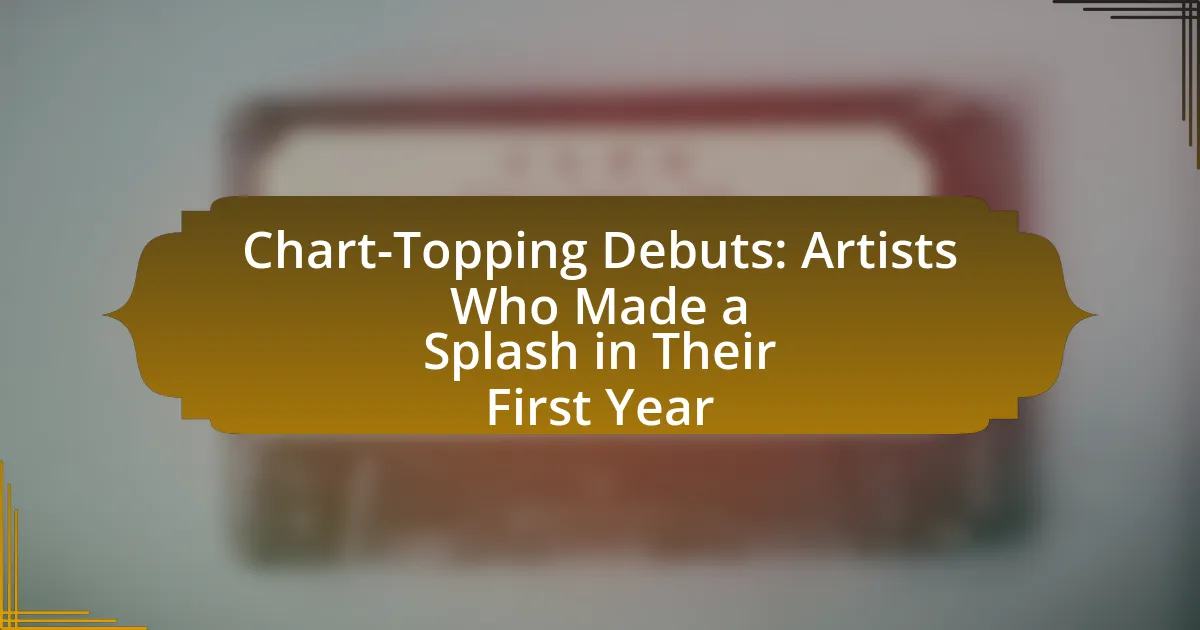Chart-topping debuts are defined by artists achieving the highest positions on music charts, such as the Billboard Hot 100 or Billboard 200, within their first week of release, often indicating strong sales and streaming numbers. The article explores how such debuts impact an artist’s career, highlighting the importance of marketing strategies, unique artistic identity, and public perception. It also examines notable artists with successful debuts, the influence of genre and timing, and the challenges faced after initial success. Additionally, it provides insights into best practices for emerging artists to maximize their debut potential and sustain momentum in the competitive music industry.

What defines a chart-topping debut for artists?
A chart-topping debut for artists is defined by achieving the highest position on music charts, such as the Billboard Hot 100 or Billboard 200, within the first week of release. This accomplishment typically indicates strong sales, significant streaming numbers, and substantial radio airplay. For instance, in 2020, Olivia Rodrigo’s debut single “drivers license” debuted at number one on the Billboard Hot 100, breaking records for the most streams in a single week, which exemplifies the criteria for a chart-topping debut.
How do chart-topping debuts impact an artist’s career?
Chart-topping debuts significantly enhance an artist’s career by establishing immediate visibility and credibility in the music industry. Such success often leads to increased media attention, higher sales, and lucrative opportunities, including endorsements and collaborations. For instance, artists like Billie Eilish and Lil Nas X experienced rapid career advancements following their debut hits, with Eilish winning multiple Grammy Awards shortly after her chart success and Lil Nas X achieving record-breaking streaming numbers. These outcomes demonstrate that a strong debut can create a foundation for sustained popularity and influence in the music landscape.
What are the key factors that contribute to a successful debut?
The key factors that contribute to a successful debut include strong marketing strategies, unique artistic identity, and timing of release. Effective marketing creates awareness and generates buzz, as seen in the case of Billie Eilish, whose debut album “When We All Fall Asleep, Where Do We Go?” was heavily promoted through social media and innovative campaigns. A unique artistic identity helps an artist stand out; for instance, Lil Nas X’s blend of country and hip-hop in “Old Town Road” captured widespread attention. Additionally, timing plays a crucial role; releasing music during peak listening seasons or aligning with cultural moments can enhance visibility and impact, as demonstrated by Olivia Rodrigo’s release of “drivers license” during a time of heightened emotional resonance among listeners.
How does public perception influence debut success?
Public perception significantly influences debut success by shaping audience expectations and engagement levels. When an artist is perceived positively, it can lead to increased media coverage, social media buzz, and word-of-mouth promotion, all of which are crucial for a successful launch. For instance, artists like Billie Eilish experienced rapid success partly due to a strong online presence and favorable public perception, which helped her debut album achieve multi-platinum status shortly after release. Additionally, research indicates that favorable public sentiment can enhance streaming numbers and sales, as seen in the case of artists who leverage social media to build a loyal fan base before their debut.
Why do some artists achieve immediate success while others do not?
Some artists achieve immediate success due to a combination of talent, marketing strategies, and timing, while others may lack these critical factors. For instance, artists like Billie Eilish gained rapid popularity through a unique sound and effective social media marketing, which resonated with audiences. In contrast, other artists may have talent but fail to connect with the right audience or lack promotional support, leading to slower recognition. Statistical data shows that artists with strong online engagement and strategic releases often see quicker chart success, highlighting the importance of these elements in achieving immediate recognition in the music industry.
What role does marketing play in an artist’s debut?
Marketing plays a crucial role in an artist’s debut by creating awareness and generating buzz around their initial release. Effective marketing strategies, such as social media campaigns, targeted advertising, and collaborations with influencers, can significantly enhance an artist’s visibility and reach. For instance, artists like Billie Eilish leveraged social media platforms to build a dedicated fan base before their debut, resulting in chart-topping success. Statistics show that artists with strong marketing support are more likely to achieve higher first-week sales and streaming numbers, underscoring the importance of marketing in establishing a successful career from the outset.
How do genre and timing affect debut outcomes?
Genre and timing significantly influence debut outcomes by shaping audience reception and market conditions. For instance, pop and hip-hop genres often dominate charts due to their broad appeal and established fan bases, leading to higher initial sales and streaming numbers. Timing also plays a crucial role; releases aligned with seasonal trends or major events can enhance visibility and engagement. For example, artists like Billie Eilish and Lil Nas X achieved rapid success partly because their debuts coincided with cultural moments that amplified their exposure. Historical data shows that albums released during the holiday season typically see increased sales, further illustrating how strategic timing can enhance debut performance.

Who are some notable artists with chart-topping debuts?
Notable artists with chart-topping debuts include Billie Eilish, whose album “When We All Fall Asleep, Where Do We Go?” debuted at number one on the Billboard 200 in 2019, and Lil Nas X, whose single “Old Town Road” topped the Billboard Hot 100 for a record-breaking 19 weeks in 2019. Additionally, Ariana Grande’s debut album “Yours Truly” reached number one on the Billboard 200 in 2013, showcasing her immediate impact on the music industry. These artists exemplify significant commercial success upon their initial releases, marking them as influential figures in contemporary music.
What genres have produced the most successful debut artists?
Pop and hip-hop genres have produced the most successful debut artists. For instance, pop artists like Billie Eilish and hip-hop artists such as Lil Nas X achieved significant chart success with their debut singles, both reaching number one on the Billboard Hot 100. According to the Billboard Year-End charts, pop and hip-hop consistently dominate the lists of top-performing debut artists, highlighting their commercial viability and widespread appeal in the music industry.
Which pop artists made a significant impact in their first year?
Billie Eilish made a significant impact in her first year with the release of her debut EP “Don’t Smile at Me” in 2017, which peaked at number 14 on the Billboard 200 and included hits like “Ocean Eyes.” Additionally, Dua Lipa’s self-titled debut album released in 2017 reached number five on the Billboard 200 and produced chart-topping singles such as “New Rules,” solidifying her presence in the pop music scene. Both artists garnered critical acclaim and commercial success, demonstrating their influence right from the start of their careers.
How did hip-hop artists redefine debut success in recent years?
Hip-hop artists have redefined debut success in recent years by achieving significant commercial milestones and cultural impact through innovative marketing strategies and genre-blending collaborations. For instance, artists like Lil Nas X and Megan Thee Stallion have utilized social media platforms to create viral moments that propel their debut singles to the top of the charts, exemplified by Lil Nas X’s “Old Town Road,” which broke the record for the longest-running No. 1 song on the Billboard Hot 100. Additionally, the rise of streaming services has allowed debut albums to gain immediate access to a global audience, with artists like DaBaby and Rod Wave achieving multi-platinum certifications shortly after their first releases. This shift emphasizes not only chart performance but also the ability to engage and resonate with audiences across diverse platforms, marking a new era of success in hip-hop.
What are the common traits of artists who made a splash in their first year?
Artists who made a splash in their first year commonly exhibit strong originality, effective marketing strategies, and a robust online presence. Originality allows them to stand out in a crowded market, as seen with Billie Eilish, whose unique sound and aesthetic garnered significant attention. Effective marketing strategies, such as targeted social media campaigns, help artists reach wider audiences quickly; for instance, Lil Nas X utilized viral TikTok trends to propel “Old Town Road” to success. A robust online presence, including engaging with fans and leveraging streaming platforms, is crucial; data shows that artists with high engagement rates on social media platforms often achieve faster growth in their early careers.
How does songwriting ability contribute to debut success?
Songwriting ability significantly contributes to debut success by enabling artists to create relatable and memorable songs that resonate with audiences. Strong songwriting skills allow artists to craft lyrics and melodies that capture emotions and experiences, which can lead to higher engagement and commercial appeal. For instance, artists like Taylor Swift and Ed Sheeran, known for their exceptional songwriting, achieved chart-topping debuts largely due to their ability to connect with listeners through personal and authentic storytelling. This connection often translates into strong sales and streaming numbers, as evidenced by Swift’s debut album “Taylor Swift,” which sold over 5 million copies in the U.S. alone, highlighting the direct impact of songwriting on initial success.
What role does collaboration play in an artist’s initial impact?
Collaboration significantly enhances an artist’s initial impact by leveraging the established audiences and creative strengths of multiple contributors. When artists collaborate with well-known musicians, producers, or songwriters, they gain immediate visibility and credibility, which can lead to a stronger debut. For instance, artists like Billie Eilish and Khalid achieved rapid success partly due to their collaborations with established figures in the music industry, allowing them to tap into existing fan bases and gain exposure through shared platforms. This strategic partnership not only amplifies their reach but also enriches their artistic output, making their initial releases more compelling and marketable.

What challenges do debut artists face after initial success?
Debut artists face several challenges after initial success, primarily including maintaining momentum, managing expectations, and navigating industry pressures. After achieving a breakthrough, artists often struggle to replicate their initial success, as evidenced by the fact that only about 20% of debut albums reach the same commercial success as their predecessors. Additionally, the pressure to produce new material quickly can lead to creative burnout, as artists may feel compelled to meet the heightened expectations of fans and industry stakeholders. Furthermore, debut artists often encounter difficulties in establishing a sustainable brand identity, as they must balance artistic integrity with commercial viability, which can complicate their long-term career trajectory.
How can artists maintain momentum after a successful debut?
Artists can maintain momentum after a successful debut by consistently releasing new content and engaging with their audience. Regularly producing music, videos, or other creative works keeps fans interested and invested in the artist’s journey. For instance, artists like Billie Eilish followed up their debut with a series of singles and an album that showcased their evolving sound, which helped sustain their popularity. Additionally, engaging with fans through social media and live performances fosters a loyal fanbase, as seen with artists who actively communicate and share behind-the-scenes content. This combination of new releases and audience interaction is crucial for sustaining momentum in the competitive music industry.
What strategies can artists employ to avoid the sophomore slump?
Artists can avoid the sophomore slump by diversifying their creative output and maintaining strong connections with their audience. Diversification allows artists to explore new genres or styles, which can refresh their artistic identity and attract a broader fan base. For instance, artists like Taylor Swift successfully transitioned between country and pop, expanding her reach and sustaining interest. Maintaining audience connections through social media and live performances fosters loyalty and engagement, as seen with artists who regularly interact with fans, ensuring they remain invested in the artist’s journey. These strategies are supported by industry observations that highlight the importance of innovation and audience engagement in sustaining long-term success.
How important is fan engagement in sustaining success?
Fan engagement is crucial for sustaining success in the music industry. Engaged fans contribute to higher sales, increased streaming numbers, and greater attendance at live events, all of which are essential for an artist’s longevity. For instance, a study by the Music Industry Research Association found that artists with strong fan engagement see a 30% increase in concert ticket sales compared to those with less engagement. This demonstrates that maintaining a loyal fan base directly correlates with sustained commercial success.
What lessons can emerging artists learn from chart-topping debuts?
Emerging artists can learn the importance of strategic marketing and audience engagement from chart-topping debuts. Successful debuts often involve a well-planned promotional strategy that includes social media campaigns, collaborations with established artists, and targeted outreach to fan bases. For instance, Billie Eilish’s debut album “When We All Fall Asleep, Where Do We Go?” utilized social media effectively, leading to significant streaming numbers and chart success. Additionally, emerging artists should recognize the value of authenticity and unique artistic identity, as seen in the debut of Lil Nas X with “Old Town Road,” which blended genres and resonated with diverse audiences. These examples illustrate that a combination of strategic marketing and a strong personal brand can significantly impact an artist’s initial success in the music industry.
What best practices should new artists follow to maximize their debut potential?
New artists should focus on building a strong online presence and engaging with their audience to maximize their debut potential. Establishing a professional website and active social media profiles allows artists to showcase their work and connect with fans. According to a 2021 study by the International Federation of the Phonographic Industry, 90% of music consumers discover new artists through social media platforms, highlighting the importance of digital engagement. Additionally, collaborating with established artists can enhance visibility and credibility, as seen with many successful debut albums that feature guest appearances. Finally, investing in quality production and marketing strategies ensures that the debut release stands out in a competitive market, as evidenced by the success of artists like Billie Eilish, whose debut album was meticulously crafted and promoted.
How can artists leverage social media for a successful launch?
Artists can leverage social media for a successful launch by creating engaging content that resonates with their target audience and utilizing strategic marketing techniques. Engaging content includes behind-the-scenes footage, teasers of upcoming releases, and interactive posts that encourage audience participation. Strategic marketing techniques involve using targeted ads, collaborating with influencers, and employing hashtags to increase visibility. According to a study by the Pew Research Center, 72% of adults use social media, making it a vital platform for artists to reach potential fans effectively. Additionally, artists who actively engage with their followers can build a loyal fanbase, as evidenced by the success of artists like Billie Eilish, who utilized social media to cultivate a strong connection with her audience prior to her debut album release.
What are the key takeaways for aspiring artists looking to make a splash?
Aspiring artists looking to make a splash should focus on building a strong personal brand, leveraging social media for visibility, and networking within the industry. A strong personal brand helps artists differentiate themselves and attract an audience, as seen with artists like Billie Eilish, who cultivated a unique image that resonated with fans. Utilizing social media platforms, such as Instagram and TikTok, allows artists to showcase their work and connect with potential listeners; for instance, Lil Nas X gained fame through viral content on TikTok. Networking is crucial, as collaborations and industry connections can lead to opportunities; many successful artists, including Dua Lipa, have credited their early collaborations with established musicians as pivotal to their careers.
